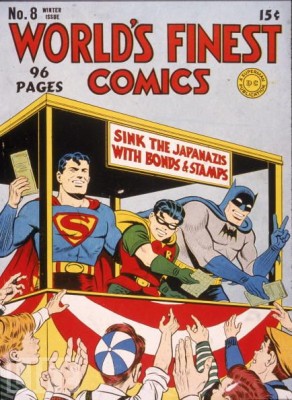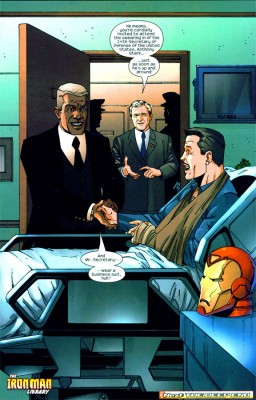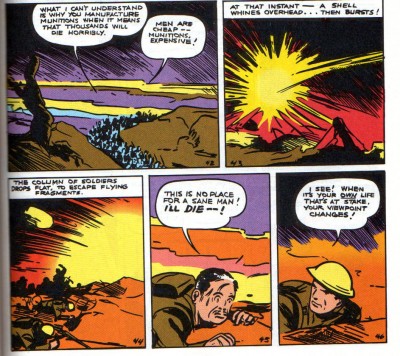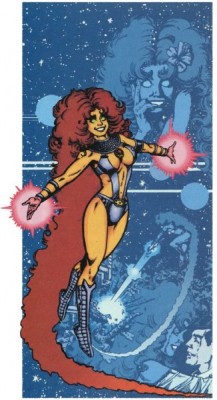

The problem with “Law and the Multiverse”
There is a blog called Law and the Multiverse, in which two lawyers write entertaining and earnest posts that are occasionally mind-bending in their level of detail about how existing laws would be applied to superheroes. The blog started in November 2010, and they’ve already been written up by BoingBoing, Volokh Conspiracy, and the New York Times.
It’s a fun way to look at the law, I guess, and an interesting (if not completely original) take on superheroes, whose absurdity is often too easy to take for granted. However, there is one major, Mjolnir-sized hole in the logic underlying the blog.
All of the laws that Law and the Multiverse examines would not exist in a world inhabited by superheroes.
Occasionally, comic books attempt to look at what would happen “if superheroes actually existed.” Perhaps the most famous and fully-realized of these works is Watchmen (and that book kind of cheats, since there’s really only one character with super powers and he works for the government anyway). Back in the 1940s a few superheroes like Captain America and Spy Smasher used the war as starting points for their stories. Mostly, however, you got very half-assed acknowledgements of the real world, like for instance the “World’s Finest” — Batman, Superman, and Robin — selling war bonds on the cover of one of their comics:
More recently there was “The Mutant Registration Act,” and the “Superhuman Registration Act,” (if superheroes existed, they’d have to register!) and the Keene Act (having secret identities is okay with the government). Or, you’ll get an occasional nod to current events, such as when Captain America took on the Tea Party, Flash Thompson went off to fight in Iraq, and Tony “Iron Man” Stark’s tenure as George W Bush’s Secretary of Defense.
You don’t have to think too hard about this before you start to realize just how utterly absurd it is to depict Superman selling war bonds, or Iron Man as the US Secretary of Defense. Why the hell is Superman selling war bonds, when he could just fly across the world and kill Hitler, Hirohito, and Mussolini? By selling the war bonds, he’s already taking sides. So why not just save the lives of literally millions of kids from all over the world — not just America — and kill those Axis leaders?
No — he’d rather raise money to send non-superhuman-powered people overseas to die, while he (for instance) went undercover as a strongman to prevent a couple of gangsters from bankrupting a circus (Action Comics issue #7).
The same is true of Iron Man as Secretary of Defense. There’s a war in Afghanistan and Iraq, so why doesn’t Tony Stark build about 50 Iron Man suits of armor, give them to 50 Navy SEALs or something, and have them take out al Qaeda?
Reality is extremely confusing and complicated. Comic books have their own complicated continuity and it’s difficult enough to keep track of all that without then, on top of everything, trying to figure out how people would actually react if there were superheroes.
But let’s try it right now.
Superman wasn’t the first superhero (by which I mean comic book and/or strip “costumed adventurer,” i.e., I’m exempting from this thought experiment such superheroic characters as Samson, Heracles, Beowulf, and Zorro), but he was the first to make it really big. He appeared in a comic book in 1938 and, even though he was created a few years before that, let’s take that as the year in which the first superheroes made themselves known.
Here was a creature that, to all outward appearances, was a normal man. Except that, according to his first appearance in Action Comics #1, he could “leap 1/8th of a mile; hurdle a twenty-story building… Raise tremendous weights… Run faster than an express train… And …nothing less than a bursting shell could penetrate his skin!”
That is a powerful guy. And he had only a fraction of the godlike power that he has now.
Superman opened the floodgates. Thousands of costumed adventurers followed, most of whom lasted maybe an issue or two, and are lost in the ashcan of history. Most of these creatures appeared to be average human beings (they had secret identities and were able to blend in with the general population). How do you think the government would react to the sudden appearance of thousands of otherwise normal-looking humans who had supernaturally high levels of strength, flight ability, x-ray vision, etc?
In 1942, after the attack on Pearl Harbor by the Japanese military, the US government rounded up and imprisoned over 100,000 Americans because they were of Japanese descent. What would the US government do about “superheroes”?
Moreover, let’s take a look at some of Superman’s targets in his earliest stories. For one, there was the mine owner. Then there was the munitions maker.
In other words, Superman was targeting well-to-do, politically connected businessmen. Do you think that the government would just stand by and allow this to happen, without radically changing the law, and, if necessary, the Constitution? Because these superheroes are to all outward appearances “normal,” the government would have a compelling interest to figure out where they all were. For starters, every person in the country would have to submit to testing, in an attempt to locate these people.
Ask yourself it that seems unreasonable to you. You are living in a country in which there are people who can level a building when they sneeze — don’t you want to know where those people are? That person next to you on the airplane. The person running your child’s daycare center. The little league coach. The head of the local chapter of the Knights of Columbus. And since they could be anyone, anywhere, and we can’t be sure that they’re all reporting themselves to authorities, we might need to use some kind of force to ensure compliance with government examination and registration programs. The Constitution does not, and should not apply to such “people.”
I just convinced you, didn’t I? And that didn’t take long, either.
According to the original comics, Superman began exhibiting extraordinary strength as a child. All babies would have to be examined by a government metahuman expert. If a child showed any characteristics of superhumanism, they would be subject to periodic check-ups throughout their lives (and mutants such as the X-Men don’t start exhibiting their unique abilities until puberty, which means that the government would probably want to keep checking everyone anyway). But that wouldn’t be enough, since many superheroes get their powers from accidents including lightning strikes, nuclear waste and chemical spills, alien visitations, radioactive spider bites, falls into vats of chemicals, and discoveries of ancient artifacts. These events can occur at any time and to any one, which means that everyone would have to be checked.
All of this would have begun in 1938. Why not? Franklin Roosevelt locked up over 100,000 people because of their ancestry.
Today, we live in a world in which superheroes don’t exist. And we are absolutely hysterical. Because of the “war on drugs,” we have about 150 drug raids every day. The drug war has “bipartisan” support. So does the “USA PATRIOT Act,” which includes provisions allowing law enforcement broad powers to conduct surveillance without getting a proper search warrant. When you get on an airplane, you are subjected to a backscatter x-ray machine and/or an “enhanced pat-down.” Plenty of people agree with this — for safety reasons. Law enforcement “fusion centers” watch the members of almost any type of political group for “suspicious activity.” Manufacturers are “scrambling to keep up with demand” for drones that kill people every day in Pakistan. Drones which are also being used along the US-Mexico border. The president claims that he has the power to assassinate Americans without a trial on the mere suspicion of being involved in terrorist activities.
Obesity is considered a “national security threat.” In some places you have to show ID to buy Nyquil. New York banned transfats awhile ago, and California just did it last year. Kids are suspended from school for bringing in toy guns, and even for pointing their fingers like a gun, or drawing an image of a gun. A state senator in New York wants to ban “walking while wired.” Some states ban sex toys.
We haven’t even gotten into environmental implications. What, for instance, is that hair contrail that Starfire leaves behind her when she flies?
You can see how hysterical we are without having to worry about people who can shoot lasers out of their eyes, walk through walls, make themselves invisible, control the weather, pick up a car and juggle it, run around at super speed, stretch their bodies into any shape, set themselves on fire, change into an animal, shrink themselves down to microscopic size, grow themselves to skyscraper size, climb walls, teleport, cast magical spells, project force fields, throw playing cards, and eat a lot. Now just imagine that we lived in a world in which there existed people who could do all of those things.
That world would be so radically different from the one in which we live that it seems almost quaint to try to figure out if Superman’s heat vision would be protected by the Second Amendment to the Constitution.
Of course, my scenario only applies to Earth-Prime. I’m sure there’s some Earth-Libertarian where everything is different.
Latest posts by Ricky Sprague (Posts)
- Meet the start-ups that are thriving in the current economic recovery - May 27, 2016
- How a Wonder Woman comic from 1942 led to the Great California Cow Exodus of 2012, maybe - November 28, 2012
- A common-sense approach to restoring economic prosperity - November 19, 2012
- New Philip K. Dick novel too absurd to be believed - September 17, 2012
- My 90 Days, 90 Reasons submission - September 12, 2012
 Print This Post
Print This Post








You make some fair points, but I’d like to address two of them.
“All of the laws that Law and the Multiverse examines would not exist in a world inhabited by superheroes. ”
Yes and no. The statement is true as far as it goes, but it’s a criticism of the realism (!) of comic books, not what we do on the blog. As described in comic books, the legal system of Marvel’s Earth-616 and DC’s Earth-One are essentially the same as the real world’s. So realistic or not, that’s what we’re given to work with, and not-coincidentally it’s what makes the blog interesting.
“That world would be so radically different from the one in which we live that it seems almost quaint to try to figure out if Superman’s heat vision would be protected by the Second Amendment to the Constitution.”
A big part of the blog’s purpose is to use comic books as a source of interesting factual scenarios that let us discuss how the law works: how lawyers and judges analyze issues and apply the law to sets of facts. In that regard it doesn’t matter too much if the facts aren’t realistic.
Really, the idea that human beings would run the world is ludicrous. Have all the ‘superhuman examination’ Nazism you want (and no, you didn’t convince me – I’m from Earth-Libertarian) but all human governments would crumble and collapse. Even peacefully, superhumans would dominate so much of the world economy and be basically untaxable. If anyone is going to have a bureaucratic dictatorship like the USA presently runs through its empire it’d have Dr. Doom or Super-Hitler (called Hate Monger in the comics) at its apex, Barack Obama’s face would be put out the other side of his face if he talked shit to Ultraman and there’s nothing ANYONE could do about it.
So you’re saying that President FDR would institute a superhero registration act and witch hunt superheroes and villains alike into internment camps, as a national security threat, for vigilantism against big business. Sounds realistic, especially against badass normals like Batman and limited-power superheroes like Golden Age Blue Beetle (invulnerable to everything but head injury) and Hourman (requires an hourly dose of super serum). Against flying bricks (invulnerable, super-strong, flying people) like Superman, Capt. Marvel, etc., speedsters like the Flash, Quicksilver, etc. and cosmic superheroes like Silver Surfer and Green Lantern, it would fail, because normal police and military would have no chance against their powers. So you and Moore are both right.